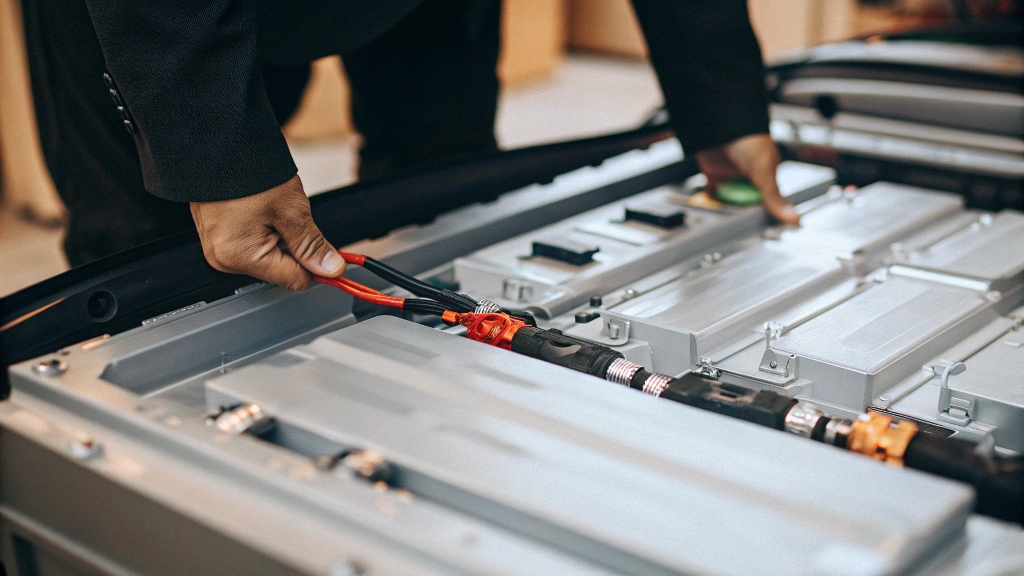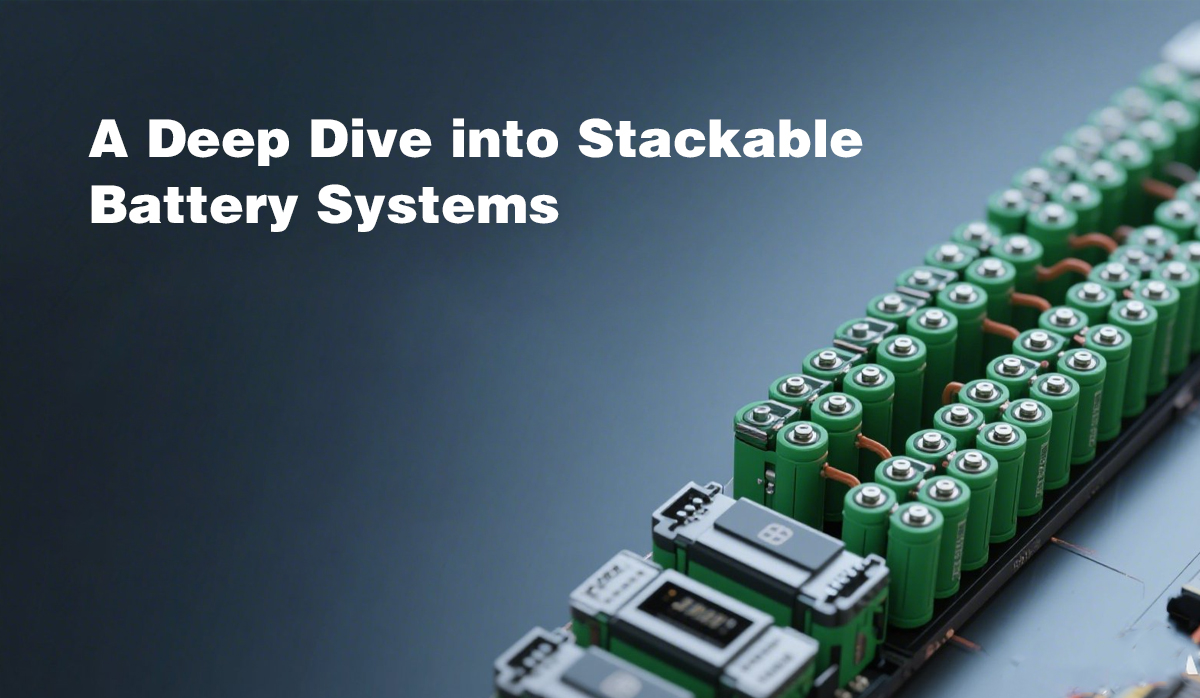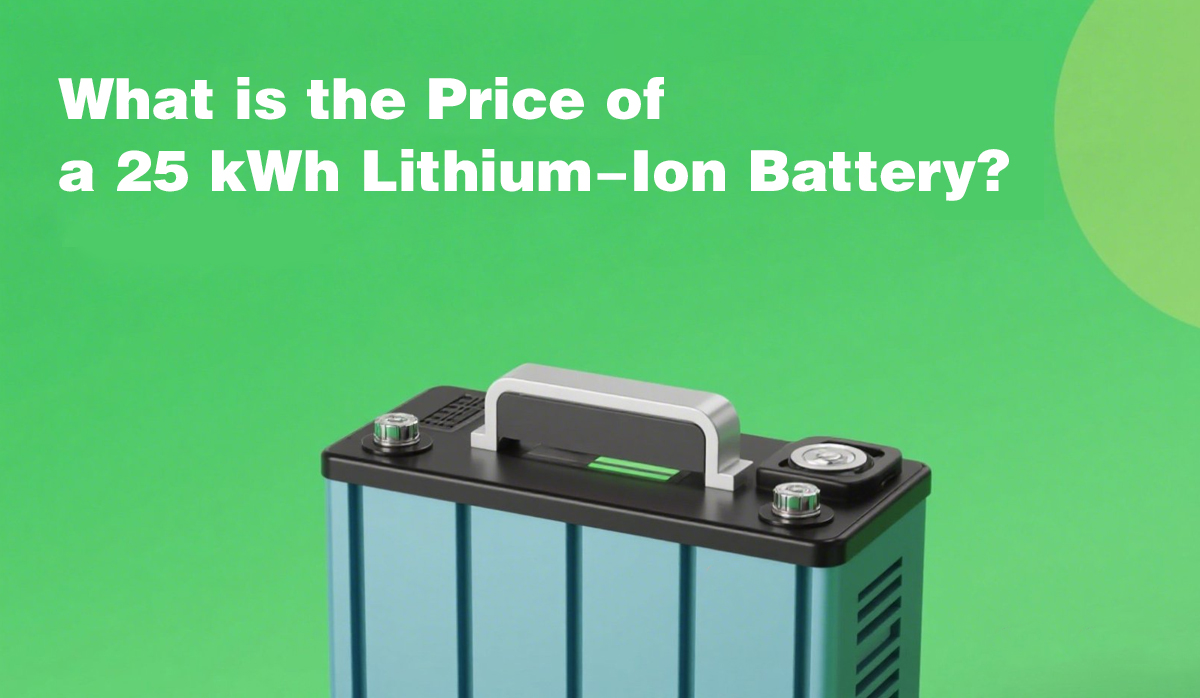Quel est le prix d'un 25 batterie au lithium-ion kwh? – Une plongée approfondie dans les systèmes de batteries empilables
1. Introduction
Alors que l’énergie solaire devient de plus en plus centrale dans notre évolution vers une énergie durable, un stockage adéquat de l’énergie est essentiel. L’une des questions les plus fréquemment rencontrées par les utilisateurs solaires résidentiels et commerciaux est, « Quel est le prix d'un 25 Batterie lithium-ion kWh?» Alors que les batteries lithium-ion sont devenues la norme en raison de leur haute densité énergétique et de leur longue durée de vie, comprendre leur structure de coûts est essentiel pour planifier votre investissement dans le système solaire.
Dans cet article, nous explorons les facteurs critiques qui déterminent le prix d'un 25 Batterie lithium-ion kWh. Nous décomposons les éléments de coût, discuter des tendances du marché, et expliquez pourquoi l'adoption d'une approche modulaire, comme l'utilisation d'un système de batterie empilable— peut offrir une meilleure évolutivité et flexibilité. En chemin, nous illustrerons également comment l'intégration de composants de haute qualité de GYCX Solar peut optimiser votre configuration de stockage d'énergie.
2. Comprendre le 25 batterie au lithium-ion kwh

UN 25 La batterie lithium-ion kWh est généralement conçue pour les applications de stockage d'énergie à moyenne et grande échelle.. Il offre une réserve énergétique conséquente capable d’alimenter les habitations, petites entreprises, ou même servir de stockage de secours pour les systèmes connectés au réseau lors de pannes de courant.
Les principales fonctionnalités incluent:
- Haute densité énergétique: La technologie lithium-ion permet une conception compacte tout en stockant une énergie importante.
- Longue durée de vie: Ces batteries sont conçues pour gérer des milliers de cycles de charge-décharge.
- Performances efficaces: Ils offrent une efficacité aller-retour élevée, ce qui signifie que moins d'énergie est perdue pendant la charge et la décharge.
Pour les applications solaires, un 25 La batterie kWh peut être un élément crucial, assurer un stockage d’énergie fiable pendant les périodes où la production solaire est faible. Cependant, son coût dépendra de plusieurs facteurs abordés dans la section suivante.
3. Facteurs de coût clés pour un 25 batterie kwh
Comprendre le prix d'un 25 La batterie lithium-ion kWh nécessite une ventilation des différents facteurs de coûts:
un. Coûts des matières premières
Les prix du lithium, cobalt, nickel, et le manganèse ont un impact significatif sur le coût de la batterie. Les fluctuations des marchés des matières premières peuvent entraîner des variations dans le prix des batteries.. À mesure que la demande augmente et que de nouvelles technologies minières émergent, ces coûts peuvent se stabiliser, voire diminuer.
b. Processus de fabrication
Les progrès des techniques de production et les économies d'échelle ont contribué à réduire les coûts de fabrication au fil des ans.. L'automatisation de la production de cellules de batterie et l'amélioration des chaînes d'assemblage permettent un rendement plus élevé avec une qualité constante.
c. Technologie et efficacité
La conception de la batterie, telle que la configuration des cellules, densité énergétique, et la cote d'efficacité - influence directement son prix. Les batteries avec des densités d'énergie plus élevées et une efficacité améliorée peuvent avoir un coût initial plus élevé, mais ils offrent des économies de coûts lors d'une utilisation à long terme.
d. Recherche et développement (R.&D)
Des investissements continus dans R&D aider à améliorer les performances et la sécurité de la batterie. Même si cela augmente les coûts initiaux, les avantages peuvent être constatés dans une longévité et une fiabilité accrues, qui ajoutent de la valeur dans le temps.
e. Échelle et demande
La demande du marché et le volume de production affectent également les prix. Des commandes plus importantes et une fabrication en vrac peuvent réduire les coûts par unité, rendre une solution modulaire plus attractive.
4. Comment les prix du marché 25 Batteries lithium-ion kWh
Les prix du marché pour un 25 La batterie lithium-ion kWh varie selon le fabricant, technologie utilisée, et région. Des rapports récents de l'industrie suggèrent que les prix peuvent varier de $8,000 à $15,000 USD. Cette large gamme reflète les différences de qualité des batteries, Conditions de garantie, et les performances globales du système.
Les évaluations des coûts prennent généralement en compte à la fois l'investissement initial et les économies à long terme.. Par exemple, alors qu'une batterie haut de gamme peut être plus chère au départ, sa durée de vie plus longue et son efficacité plus élevée peuvent réduire le coût par kilowattheure utilisable tout au long de sa durée de vie. Les clients doivent également prendre en compte l'installation, entretien, et les futures mises à niveau potentielles.
5. Avantages d'un système de batterie empilable
UN système de batterie empilable représente une approche modulaire du stockage d’énergie. Plutôt que de compter sur un seul, unité de batterie monolithique, un système empilable se compose de plusieurs modules plus petits qui peuvent être connectés ensemble.
Les avantages incluent:
- Évolutivité: Ajoutez facilement plus de modules à mesure que vos besoins énergétiques augmentent.
- Flexibilité: Personnalisez votre parc de batteries en fonction de vos besoins actuels sans surinvestir.
- Facilité d'entretien: Les modules plus petits sont souvent plus faciles à entretenir ou à remplacer individuellement.
- Résilience améliorée du système: Un système modulaire peut offrir une redondance, en cas de panne d'un module, le reste du système peut continuer à fonctionner.
Par exemple, dans une application de stockage solaire, un système de batterie empilable peut commencer avec une configuration de base et s'étendre au fil du temps pour répondre à des demandes de puissance croissantes. Cette flexibilité en fait une option attrayante pour les propriétaires et les entreprises qui planifient des investissements à long terme dans les énergies renouvelables..
6. Calculer le coût total d'un 25 batterie kwh

Passons en revue un calcul de base pour comprendre le coût de la batterie. Supposons que l'étude de marché montre un coût d'environ $12,000 pour un 25 Batterie lithium-ion kWh basée sur la technologie actuelle et les tendances de production. Ce chiffre comprend:
- Coûts du matériel: Les matières premières représentent une part importante de ce prix.
- Frais généraux de fabrication: Travail, machinerie, et le contrôle qualité s'ajoutent au coût global.
- R.&Dépenses D: Ceux-ci sont amortis sur la durée de vie projetée de la batterie.
Même si ces coûts constituent une base de référence, prendre en compte des facteurs supplémentaires tels que les frais d'installation, intégration avec d'autres composants du système, et les incitations ou réductions potentielles disponibles dans votre région.
7. Intégration d'une approche modulaire de stockage d'énergie
L'une des stratégies clés pour maximiser la rentabilité et les performances consiste à utiliser une approche modulaire du stockage sur batterie.. C'est là qu'un système de batterie empilable brille.
Comment fonctionne un système modulaire:
- Module de base: Commencez avec une unité plus petite qui répond à vos besoins immédiats de stockage d’énergie.
- Unités extensibles: À mesure que vos besoins énergétiques augmentent, ajoutez plus de modules de manière transparente.
- Interopérabilité: Assurez-vous que chaque module dispose d'une interface compatible pour une connexion facile avec d'autres composants du système.
L'adoption d'un système modulaire aide non seulement à gérer les coûts, mais offre également une flexibilité pour une expansion future.. Cette approche minimise le risque de surinvestissement dans la capacité inutilisée et vous permet d'aligner les mises à niveau sur l'évolution de vos besoins énergétiques..
8. Intégration des produits solaires GYCX dans votre système
À Solaire GYCX, notre gamme de produits est conçue pour offrir des solutions intégrées, évolutif, et des solutions énergétiques efficaces. Nous proposons plusieurs produits qui répondent aux besoins évolutifs des systèmes d'énergie solaire modernes..
Batterie au lithium empilable
Notre Batterie au lithium empilable la solution est conçue pour la flexibilité et l’évolutivité. Il vous permet de créer un parc de batteries qui peut croître avec vos besoins énergétiques sans avoir besoin d'une refonte complète du système..
Batterie solaire
Pour les clients à la recherche de produits fiables, stockage d'énergie spécialement conçu, notre Batterie solaire la gamme offre une efficacité et une durabilité élevées adaptées aux applications d’énergie renouvelable.
Onduleur solaire
Un élément essentiel de tout système d'énergie solaire est une qualité Onduleur solaire, qui convertit l'énergie CC stockée en alimentation CA. Nos onduleurs sont optimisés pour une efficacité de conversion élevée et une intégration transparente avec nos systèmes de batteries.
En combinant ces produits, vous pouvez créer un système d'énergie solaire robuste qui non seulement répond à vos besoins énergétiques actuels, mais qui évolue également de manière gracieuse à l'avenir..
9. Tendances et considérations futures
Le marché du stockage des énergies renouvelables est en constante évolution, motivé par les progrès technologiques et l’évolution des demandes des consommateurs. Voici quelques tendances futures à surveiller:
un. Innovations technologiques
Améliorations continues de la chimie cellulaire, systèmes de gestion de batterie (GTC), et les processus de fabrication devraient réduire davantage les coûts et améliorer l’efficacité. Les futures itérations de systèmes de batteries empilables pourraient offrir des densités d'énergie encore plus élevées et des durées de vie plus longues.
b. Adoption accrue et économies d’échelle
Alors que les installations solaires se développent dans le monde, les fabricants bénéficieront d’économies d’échelle, réduisant potentiellement les coûts unitaires. Cette tendance rend les solutions avancées de stockage d’énergie plus accessibles à un marché plus large..
c. Facteurs réglementaires et environnementaux
Incitations gouvernementales, politiques énergétiques, et les considérations de durabilité influenceront également le prix des batteries. L'accent mis sur le développement de technologies respectueuses de l'environnement encouragera l'amélioration du recyclage et de la gestion des ressources pour les batteries lithium-ion..
d. Intégration avec les technologies intelligentes
L’avenir du stockage d’énergie réside dans l’intelligence, systèmes interconnectés. Surveillance avancée, Intégration IoT, et la maintenance prédictive garantira que les systèmes de batteries fonctionnent avec une efficacité et une fiabilité maximales, réduire les coûts opérationnels globaux.
10. Conclusion
Comprendre le prix d'un 25 La batterie lithium-ion kWh implique plus qu'un simple calcul du dollar par kWh : elle nécessite un examen approfondi des matières premières, processus de fabrication, et innovations technologiques. Vous pouvez choisir que l'investissement dans une batterie de haute qualité soit rentable grâce à des performances améliorées, longue durée de vie, et une efficacité améliorée.
Adopter un système de batterie empilable offre de nombreux avantages, y compris l'évolutivité, flexibilité, et facilité d'entretien. À Solaire GYCX, nos solutions de produits intégrées, telles que notre Batterie au lithium empilable, Batterie solaire, et Onduleur solaire-sont conçus pour construire un robuste, système de stockage d’énergie évolutif adapté à vos besoins.
En évaluant soigneusement vos besoins énergétiques, comprendre les principaux facteurs de coûts, et intégrant des modules, composants de haute qualité, vous pouvez construire un système d'énergie solaire efficace et évolutif qui répond aux demandes actuelles et futures.
Adoptez l'approche modulaire du stockage d'énergie et assurez-vous que votre investissement dans les énergies renouvelables est conçu pour durer..
Gycxsolar fournit des produits de batterie au lithium de haute qualité et tous les composants des systèmes d'énergie solaire aux clients du monde entier.
En même temps, Nous avons des experts offrant des services de solution de conception gratuits.
Un service d'arrêt pour résoudre vos problèmes, Un service de haute qualité met le gycxsolar dans une position de premier plan dans l'industrie.
Votre consultation est la bienvenue.

